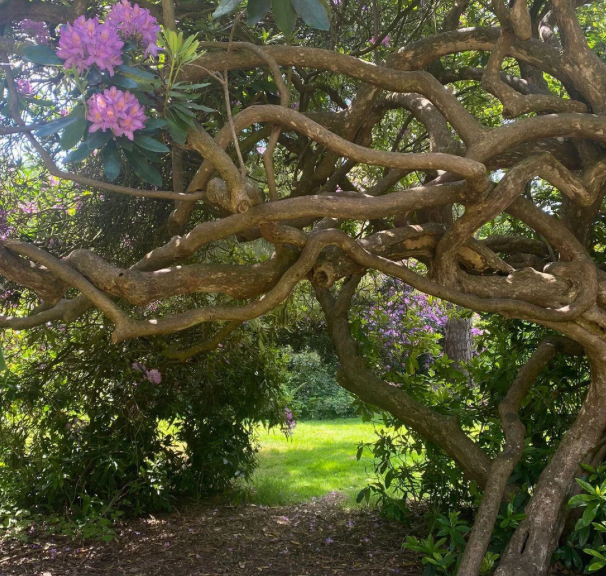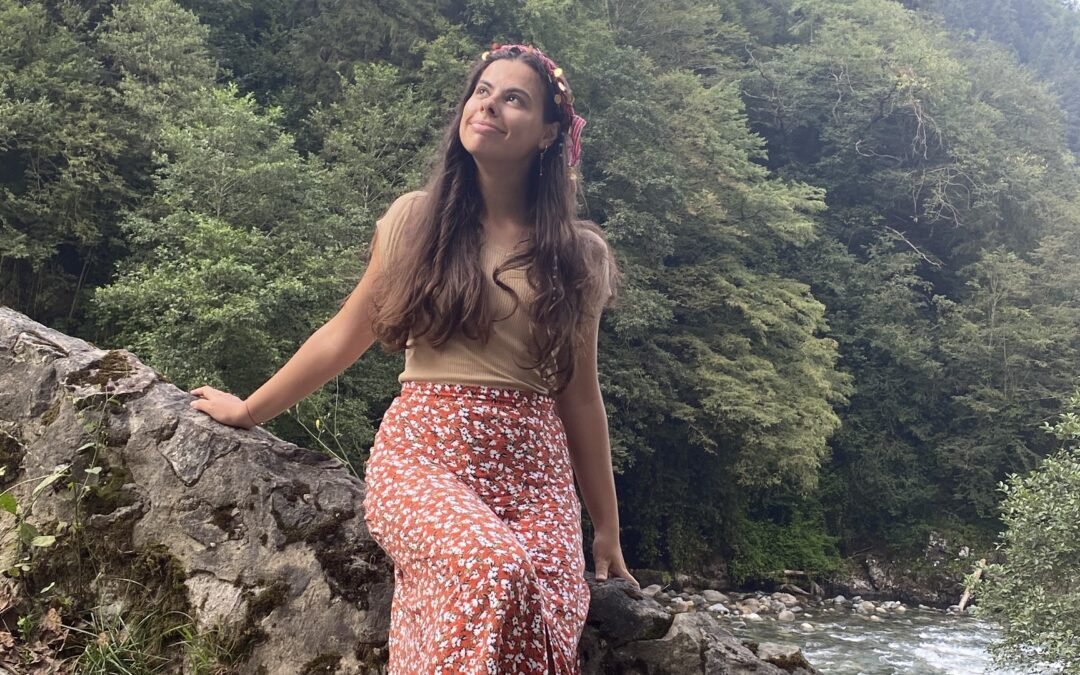A reflection on impermanence, grief, and the sacred act of letting go
This body is an avatar, a temporary vessel we inhabit. There is something quietly beautiful about being human, fragile as it is. We arrive with a nervous system designed to receive signals, create emotions, and translate experience into meaning.
The mind observes.
The body understands.
Together, they form the story of what it means to truly feel.
And within this life, we are always given a choice. Will we attach ourselves to what happens outside of us, reacting and resisting? Or will we remember that every moment is simply passing through, offering experience without demanding attachment?
We can choose joy even in the presence of pain.
Not because we do not hurt.
But because we remember that what we love was never ours to keep.
It was ours to cherish.
The Nature of Love Without Possession
Sometimes loss enters our lives quietly, through the slow fading of a relationship.
A text left unanswered. A call that never comes. A silence that deepens over time.
Other times, it crashes in—sudden, violent, undeniable—like the breaking of something you never thought could break.
A dish you held from childhood. A friendship you thought would last forever.
And sometimes, it arrives not with noise or finality, but with the quiet ache of realization:
What you once loved—once held close—is no longer within reach.
Grief and loss wear many faces.
All of them ask us to feel.
To pause.
To remember.
To soften.
Because the pain of loss is not only about what is gone.
It’s about the shattering of belonging.
The moment “mine” becomes “was.”
My partner
My father
My home
My tree
We name what we love.
We fold it into our lives.
We build stories around it, futures upon it.
We wrap it in the language of possession: my.
As if love alone could make something permanent.
As if holding tighter could stop time.
But was it ever truly ours to keep?
Is anything?
Learning how to cope with loss requires us to sit with the ache, without rushing to fix it.
To allow the sadness to exist without shame.
This is how true emotional healing begins, not by escaping pain, but by honoring it.
Our thoughts are not just electrical firings. They are messengers, flowing through the mind-body system like weather across the sky. The mind-body connection shows how deeply our emotions shape our inner world. A memory can stir grief. A scent can trigger longing. A kind word can ease sorrow.
To be human is to carry all of it: joy, fear, hope, and the quiet ache of loss.
This is where grief enters, not as an enemy, but as a reminder. It reveals how much something mattered. It shows us that love and loss are not separate.
Love meets loss when we recognize that everything we care for is temporary.
Nothing is truly ours to keep, only ours to cherish while it’s here.
And within this life, we are always given a choice.
Will we attach ourselves to what happens outside of us, reacting and resisting?
Or will we remember that each moment is simply passing through, offering experience without demanding possession?
This is the heart of navigating grief, not rushing past it, but learning to be with it.
Coping with loss is not about erasing pain.
It’s about honoring it.
Staying with it.
Letting it soften us, not harden us.
We can choose joy even in the presence of pain.
Not because we are untouched by sorrow.
But because we remember that what we loved was never truly ours.
It was a gift: a fleeting moment, never promised.
And when we live with that truth, something inside us becomes calm.
Not because we’ve conquered loss, but because we’ve stopped resisting its truth.
Grief is not a disruption to life.
It is life.
It teaches us to feel deeply, to release gently, and to begin again.
In the end, we are here to love, even knowing we will one day lose.
And somehow, that makes the love more real, not less.
Love, when stripped of ownership, becomes something else.
Not weaker yet wiser.
Still fierce, still full-hearted, but free.
It does not clutch.
It does not bind.
It sees clearly, and still stays.
And when the time comes, it lets go with grace.
Perhaps this is what grief tries to teach us:
That the point was never to own.
The point was to love while we could.
To love, and let love change us.
When we do this, loss becomes something more than sorrow.
It becomes wisdom, a quiet transformation.
And from that space, something new begins to grow.
Coping with loss can be an overwhelming experience. For practical strategies, check out my guide to coping with overwhelming emotions.

The Tree That Was More Than a Tree
Not long ago, I lost a tree I deeply loved.
To others, it may have seemed like just a tree. But to me, it was something more.
It stood right in front of my home, a constant presence through every season.
Every morning, I would see birds fluttering through its branches, filling the air with their cheerful songs. They sang for no one and for everyone, and somehow, their joy became part of my day. That tree didn’t just hold leaves. It held life.
It was presence in the middle of chaos.
It was rooted stillness in a world that never stops moving.
It was my companion in silence.
It felt like it belonged to me.
I never imagined it would disappear.
But one day, it did.
Cut down.
Gone.
Removed without warning, as if it had never stood there at all.
Its absence was so loud.
And I grieved.
Have you ever had something like that in your life?
Maybe not a tree. Maybe a pet with soft paws and kind eyes.
Maybe a quiet café that held your heartbreak.
Maybe a person whose voice made you feel like home.
Grief doesn’t always come wrapped in funerals.
Sometimes, it comes with the sudden silence of birds.
With the emptiness outside your window.
With a gap you didn’t know your heart had filled.
We don’t only mourn people. We mourn places, memories, and living things that once made us feel safe.
That tree mattered.
And losing it cracked something open in me I didn’t know was closed.

Moving Through Grief
Psychiatrist Elisabeth Kübler-Ross introduced a powerful model that continues to guide how we understand the grieving process. She outlined five stages of grief: denial, anger, bargaining, depression, and acceptance. While originally developed in the context of terminal illness, this framework has helped millions navigate different types of emotional pain, from the death of a loved one to personal setbacks and unexpected life changes. The stages of grief offer a map—but not a fixed route—through the often overwhelming terrain of loss.
But the truth is, grief is not linear. It moves in waves. Just when you think you’ve reached emotional healing, you may find yourself pulled back into sorrow or confusion. This is common when you’re coping with loss of any kind whether it’s a person, a job, a relationship, or even something symbolic like a cherished place. Emotional ups and downs are part of processing emotions, not a sign of failure. Learning to sit with discomfort, without rushing yourself to “move on,” is a key part of navigating grief and finding long-term emotional wellness. For more information on coping strategies, visit the Mayo Clinic’s guide on grief and loss.
I came to understand this more deeply through a surprising source: the loss of a tree. This tree had been a part of my life for years offering shade, quiet companionship, and a sense of grounding in nature. When it was cut down, I was shocked by the emotional response it triggered in me. I found myself cycling through the stages of grief, revisiting anger, sadness, and eventually reaching a quiet sense of acceptance. That experience taught me that dealing with change even when it seems small to others can carry emotional weight. And all forms of loss deserve space, time, and compassion.
Grief does not follow a straight path. It moves like a current. It takes you forward and then pulls you back. It repeats itself just when you think you are done. How I Coped with Grief After Losing My Tree:
Understanding the Stages of Grief
Denial
At first, my eyes refused to believe what they saw
I stared out the window again and again hoping to catch a glimpse of the familiar silhouette
Maybe it was still there but hidden from view
Maybe my mind was playing tricks on me and it hadn’t really disappeared
I waited, breath held, willing the tree to reappear as if by magic
But no matter how long I looked, the space where it once stood remained empty and silent
A hollow ache settled deep in my chest as reality crept in like a slow, cold tide
Anger
Then a quiet fury ignited within me
Anger burned at the sound of the saw which still echoed in my ears long after it fell silent
How could they have taken it away so easily without asking?
How could I have been powerless to protect something that had given me so much
Shade on hot afternoons, a home to birds and whispers of wind that soothed my restless thoughts
I wanted to scream at the sky and at myself for not doing more
The unfairness of losing something so alive and generous filled me with a bitter grief I could barely contain
Bargaining
My mind grasped for hope in the darkness
I imagined the stump might sprout new leaves if I watered it with care and whispered to it at night
Maybe the roots were still alive beneath the soil waiting for a chance to grow again
I told myself stories where the tree came back stronger and fuller than before
A secret miracle I could nurture if only I tried hard enough
I clung to these fantasies like a lifeline, desperate to rewrite the ending where the tree never truly left
Depression
But soon the weight of loss settled in like a thick fog
The empty space became a silent reminder of what was gone forever
No more rustling branches dancing in the breeze
No more shade that held me safe from the harsh sun
The peace it had offered felt irreplaceable, a quiet sanctuary I had taken for granted
Memories washed over me in waves, moments of calm beneath its leaves, the soft creak of its limbs
And I felt the unbearable ache of absence deep in my bones
Loneliness wrapped around my heart like winter’s chill, heavy and unrelenting
Acceptance
In time, slowly and with gentle patience, understanding began to bloom
Though the tree was gone, its spirit lived on inside me
It had given me more than shade. It had taught me stillness and presence
A silent gift that did not demand but simply was
I realized that loss does not erase love or memory
The tree’s branches may no longer reach for the sky but its roots remain deep in my soul
And in that quiet place, I carry its light forward
Grateful for the time we shared and the peace it brought
The tree is gone from my view but forever alive in my heart.
Twisting time for sacred grief…

What Loss Leaves Behind
Everything and everyone we love is temporary.
This truth can feel unsettling at times, yet it is not meant to scare us. Rather, it is meant to awaken us to the deeper reality of life. Change and loss are inevitable parts of our journey. Recognizing this allows us to appreciate what we have while it lasts and to honor what has passed by reflecting on the gifts those people, places, or things have brought into our lives.
Instead of asking why something is taken away, perhaps we can ask what it gave us while it was here.
What did this person, place, or object awaken within you? Did it reveal your ability to love more deeply, to be more patient, or to grow stronger in difficult times? Did it teach you valuable lessons such as kindness, courage, or empathy that continue to live within you today?
What did this person or place or object awaken in you?
What blessings did they embody?
What can you carry forward as a way to honor what you have lost?
When we face loss, it can leave us feeling empty and overwhelmed. Yet within this space of absence, there is also room for growth and transformation.
If someone gave you compassion, live more compassionately.
If they brought you laughter, share joy with others.
If they made you feel safe, become that safety for someone else.
Though loss closes one chapter of our lives, it also opens the door to new beginnings. It invites us to embody the best parts of what we once held dear, to keep memories alive through our actions, and to allow love to continue shaping who we are. The essence of what we loved does not disappear when it is gone. Instead, it transforms and becomes a vital part of our story.
This transformation is like a gentle light that stays with us, reminding us that what truly matters cannot be taken away. Our capacity to love, to remember, and to grow remains with us, shining brightly through every new day.
They may be gone.
But what they sparked in you remains.
Grief Is Not Something to Fix
There is no right way to grieve.
There is no schedule, no formula, no quick escape.
Grief asks to be felt.
It brings confusion, anger, sorrow.
It might sound like:
What happens to me now?
You can’t just leave me like this.
These emotions are not wrong.
They are your soul’s way of saying, “This mattered.”
Let them speak.
Write to what you lost.
Write to the person, the place, the memory.
Not to solve anything.
But to honor it.
To express what still lives within you.
Because grief, when met with presence, becomes wisdom.
And from that wisdom, something new can take root.
You may notice that grief arrives in the quiet moments while folding laundry, standing in line, hearing a song you forgot you loved. These moments are reminders: love was here. Still is.
Instead of pushing away the pain, allow it to sit beside you. Let it become part of your story, not the whole of it. Healing doesn’t mean forgetting. It means remembering with softness, with breath, with space.
When you meet your grief with tenderness instead of judgment, you create room for transformation.
From the ache, something beautiful may slowly emerge: resilience, clarity, depth.
This is the quiet alchemy of loss.
Not an end, but a becoming.
Coping with Loss: Keep Walking
The goal is not to forget.
The goal is not to move on as if nothing happened.
The invitation is to integrate the loss.
To carry its meaning forward.
To let it shape your heart without closing it.
Loss will change you.
Let it deepen you rather than harden you.
Let it remind you how deeply you are capable of loving.
Let it open you wider to this precious, fleeting life.
So take your time.
Breathe.
Remember.
And keep walking.
You are not walking alone.
With all that I am,
Love
Esra

